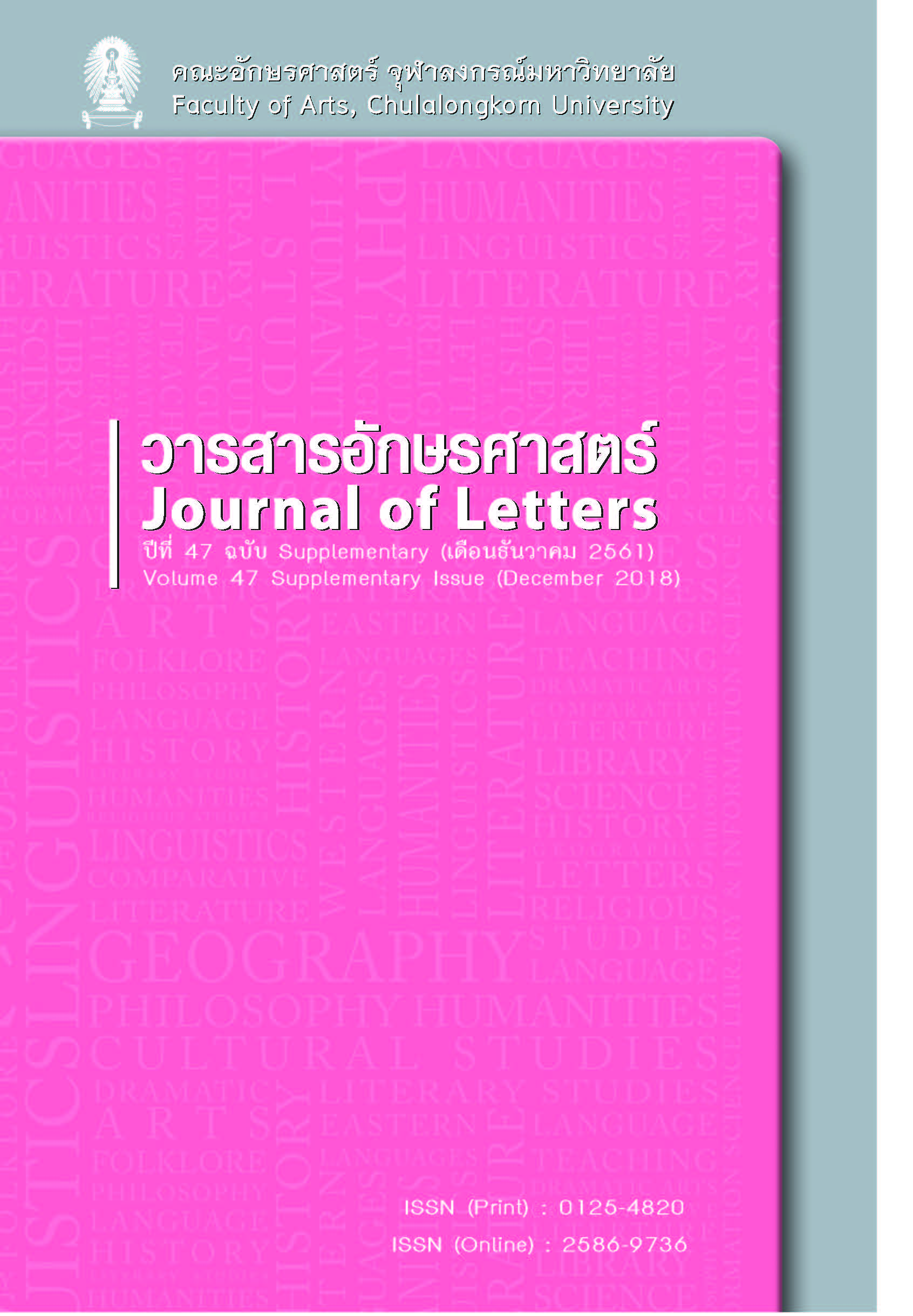Conceptual Metaphors for “Refugees” in Online Newspapers: An Empirical Study in German and in Thai
Keywords:
Metaphernanalyse, Konzeptuelle Metapher, Flüchtlinge, Kognitive LinguistikAbstract
This research article investigates the comparative language usage of refugee metaphors in German and Thai in two selected online newspapers: Süddeutsche Zeitung and Thairath. According to Lakoff and Johnson’s (1980) cognitive theory of the conceptual metaphor, metaphors exert a major influence on our thinking, perceptions and behaviour in everyday life. This study uses both quantitative and qualitative methods to analyze data from a German and a Thai corpus. It was found that twelve source domains are used in German and Thai data. In both corpora, refugees were represented in six domains, namely as goods, enemies, water, objects, guests/visitors and vehicles. Three metaphorical concepts were found only in the German corpus: refugees as travellers, people in need and loads, whereas in the Thai corpus, refugees were represented as people, games and animals. These metaphorical concepts have predominantly negative connotations and therefore their appearance in mass media has a negative influence on public perceptions of refugees.
References
Black, Max. 1954. Die Metapher. In Theorie der Metapher. Studienausgabe, hg. v. Anselm Haverkamp, 55-79. Darmstadt: WBG.
Böke, Karin. 1997. Die „Invasion“ aus den „Armenhäusern Europas“. Meta¬phern im Einwanderungsdiskurs. In Die Sprache des Migrationsdiskurses. Das Reden über „Ausländer“ in Medien, Politik und Alltag, hg. v. Matthias Jung, Martin Wengeler und Karin Böke,164-193. Opladen: Westdeutscher Verlag.
Böke, Karin. 2000. Metaphern für die Immigration. In Ausländer und Immigranten im Spiegel der Presse. Ein diskurshistorisches Wörterbuch zur Einwanderung seit 1945, hg. v. Matthias Jung, Thomas Niehr und Karin Böke, 131-154. Wiesbaden: Westdeutscher Verlag.
Gesellschaft für deutsche Sprache. 2015. GfdS wählt »Flüchtlinge« zum Wort des Jahres 2015. https://gfds.de/wort-des-jahres-2015/, abgerufen am 14.02.2017.
Girnth, Heiko. 2015. Sprache und Sprachverwendung in der Politik. Berlin/Boston: Walter de Gruyter.
Kanchalika Treeklangdorn und Siriporn Panyametheekul กัญชลิกา ตรีกลางดอนและศิริพร ปัญญาเมธีกุล. 2017. Konlawitee
tangpasa tee nangsuephim thai chai nai kannamsanue kloom chattipan rohingya กลวิธีทางภาษาที่หนังสือพิมพ์ไทยใช้ในการนำเสนอกลุ่มชาติพันธุ์โรฮีนจา [Language Strategies Used to Portray the Rohingya People in Thai Newspapers].
Warasarn Vannavidas วารสารวรรณวิทัศน์ [Journal of Thai language, literature and culture] 17: 162-187.
Lakoff, George, Johnson, Mark. 1980. Metaphors we live by. Chicago/London: University of Chicago Press.
Lieb, Hans-Heinrich. 1996. Was bezeichnet der herkömmliche Begriff ‘Metapher’? In Theorie der Metapher. Studienausgabe, hg. v. Anselm Haverkamp, 340-355. Darmstadt: WBG.
Liebert, Wolf-Andreas. 2008. Metaphernforschung. In Rhetorik und Stilistik. Ein internationales Handbuch historischer und systematischer Forschung. (1. Halbband), hg. v. Ulla Fix, Andreas Gardt und Joachim Knape, 743-757. Berlin/New York: Walter de Gruyter.
Pielenz, Michael. 1993. Argumentation und Metapher. Tübingen: Narr Verlag.
Statista. 2017. Überregionale Tageszeitungen in Deutschland nach verkaufter Auflage im 4. Quartal 2017. https://de.statista.com/statistik/daten/ studie/73448/umfrage/auflage-der-ueberregionalen-tageszeitungen/, ab¬gerufen am 14.02.2017.
Schmitt, Rudolf. 2017. Systematische Metaphernanalyse als Methode der qualitativen Sozialforschung. Wiesbaden: Springer.
Spieß, Constanze. 2017. Vom Flüchtlingsstrom bis hin zum Flüchtlings-tsunami? Metaphern als Meinungsbildner. Magazin erwachsenen-bildung.at. Das Fachmedium für Forschung, Praxis und Diskurs 31: 1-5.
Thai Journalists Association สมาคมนักข่าวหนังสือพิมพ์แห่งประเทศไทย. 2016. Wikrit nangsuephim mai auwasan tae padnguea วิกฤตหนังสือพิมพ์ไม่อวสาน แต่ปาดเหงื่อ [Zeitungskrise: Das ist nicht das Ende, aber gerät in Schwierigkeiten]. https://www.tja.or.th/index.php?option=com_content& view=article&id=4071:2016-08-10-10-42-50&catid=158:-31-2559-, abgeru¬fen am 14.02.2017.
Weinrich, Harald. 1976. Sprache in Texten. Stuttgart: Klett-Cotta.
Downloads
Published
How to Cite
Issue
Section
License
Copyright and plagiarism
Authors are responsible for obtaining permission to use copyrighted materials from copyright owners. Authors are responsible for observing requisite copyright law when quoting or reproducing copyrighted materials. Quotations and reproductions of content from other published sources must be accompanied by a reference and all sources should be clearly listed in the references section. Quotations and reproductions of content from external sources without due attribution could be considered a severe infringement of academic conduct and may constitute a legal offence under the Copyright Act of B.E. 2537. Any legal ramifications arising from the infringement of copyright regulations would be the sole responsibility of the author(s).



